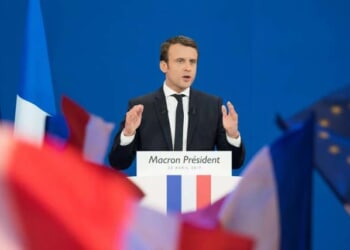Winston Churchill is famed for his adamant and courageous opposition to appeasement. What is not as well known is that Churchill also praised appeasement in strong terms: “Appeasement from strength is magnanimous and noble, and might be the surest and perhaps the only way to world peace.”
One must, however, discern the difference between that and appeasement from weakness and fear, which, he declared, “is alike futile and fatal.”
The pride of tyrannies is legendary. They regularly require human sacrifice as evidence of their power.
Deep into his years-long and often lonely efforts to mobilize Parliament and the people to the stark urgency of confronting Hitler, Churchill began a new book project that would eventually fill four volumes and which he would title A History of the English-Speaking Peoples. He made clear the large aim of the work to one of his literary assistants in the project:
In the main, the theme is emerging of the growth of freedom and law, of the rights of the individual, of the subordination of the State to the fundamental and moral conceptions of an ever-comprehending community. Of these ideas the English-speaking peoples were the authors, then the trustees, and must now become the armed champions. Thus I condemn tyranny in whatever guise and from whatever quarter it presents itself. All of this of course has current application.
The dovetailing between that project and his campaign to awaken Britain to rearm and confront Hitler was summarized by Churchill biographer and historian Martin Gilbert:
As Churchill saw it, parliamentary democracy and dictatorship not only stood at opposite poles but had no common ground. Democracy had to defend itself.
And so, when appeasement from weakness led to war, as Churchill knew it must, he could set the aims of the armed struggle in the clearest, broadest, and most morally persuasive terms. This is how Churchill put it in his first speech to the House of Commons after Hitler began the war:
This is no war for domination or imperial aggrandisement or material gain; no war to shut any country out of its sunlight and means of progress. It is a war, viewed in its inherent quality, to establish, on impregnable rocks, the rights of the individual, and it is a war to establish and revive the stature of man.
The power of this speech, as of so many that were to follow, was a direct result of Churchill’s lifelong commitment to the constitutional liberty of the individual. He did not luck upon his rhetoric and the palpable conviction which suffused it. It was rather the result of a life of dedication of all his God-given powers to a cause he believed essential to human happiness and even to the survival of civilization.
Tyrants of all sorts believe that democracies are weak and vulnerable. They see freedom, especially free political speech, as chaotic and dissolutive of the power of the state. While democracies have been prone to such problems, Churchill saw in both the British and American constitutions the tried strength to overcome those proclivities. At the same time, he saw, free citizens bring the fullest measure of devotion to the cause of the constitutional state, for they rightly see its cause is their own.
Such devotion, Churchill understood, was the key to victory in the severe and deadly struggle that a righteous war requires. Churchill spoke of this in that same address of September 3, 1939, putting in a positive perspective the long and failed effort to avoid war by concessions:
In this solemn hour it is a consolation to recall and to dwell upon our repeated efforts for peace. All have been ill-starred, but all have been faithful and sincere. This is of the highest moral value—and not only moral value, but practical value—at the present time, because the wholehearted concurrence of scores of millions of men and women, whose co-operation is indispensable and whose comradeship and brotherhood are indispensable, is the only foundation upon which the trial and tribulation of modern war can be endured and surmounted. This moral conviction alone affords that ever-fresh resilience which renews the strength and energy of people in long, doubtful and dark days. Outside, the storms of war may blow and the lands may be lashed with the fury of its gales, but in our own hearts this Sunday morning there is peace. Our hands may be active, but our consciences are at rest.
In the confused and violent rhetoric against the cause of Israel at loose in this country and around the world, Churchill’s words are immensely clarifying. As they were meant to be in his time, so they are in ours, because they are founded on enduring truths and not on cheap rhetorical sleight-of-hand that cannot survive the scrutiny of caring, reasonable, and moral people.
Israel has a long, long record of seeking peaceful cooperation with all its citizens and its neighbors. Its conscience is clear. It knows what it has risked for peace and what it has cost Israel in treasure and in blood.
For decades, Jews bought land in strict compliance with the laws of the Ottoman authorities. The commitment of Britain to the cause of a Jewish home was not obtained by force or by threats. Chaim Weizmann spoke with Emir Faisal, who had led an Arab army in the Allied cause, and the outlines were aired of a peaceful settlement of the land in which both Jews and Arabs would have freedom.
But the secret Sykes-Picot agreement that gave priority to the colonial ambitions of Britain and France, pulled the rug out from under Faisal and Weizmann’s feet. As well, the British appointment of a violent, Jew-hating cleric as Crown-endorsed Muslim authority in Jerusalem, led the affairs in the Holy Land in an increasingly violent direction, leading to the massacre of the old religious Jewish community of Hebron in 1929 and eventually into a full-fledged three-year rebellion targeting the British and the Jews equally, that only ended when World War II began.
When the Peel Commission attempted to find a way to peace in 1938, the Jewish Agency, representing the Jewish community in the Holy Land, came to London to join the talks; the Arab representatives refused to sit in the same room with them or negotiate directly. When the Commission recommended devoting a tiny proportion of the Holy Land for an independent state, excluding Jerusalem and much else, the Jewish Agency accepted this, but the other side rejected it.
When the UN voted a partition of the Land in 1947, including much less than what would be the pre-1967 armistice boundaries of Israel, the Jewish Agency accepted the decision, but Arabs began an undeclared war. When Israel declared independence the day the British withdrew, Egypt, Iraq, Syria, Lebanon, and Jordan all committed to war.
Israel defeated all those nations in its War of Independence and accepted the armistice terms set at Rhodes in 1949. A long campaign of guerilla raids from Egyptian-controlled-Gaza and from Jordan into Israel ensued as well as denial of navigation to Israel in international waters and the Suez Canal. All these acts of war led to Israel’s victorious campaign in the Sinai against Egypt. Israel withdrew from the land taken in that campaign under UN assurance that its own peacekeepers would maintain its rights and borders. But then when Nasser chose to make war on Israel in 1967, the UN withdrew instantly without a fight. Israel saved itself from extinction in the Six Day War.
After that war, Israel publicly offered to restore territory it had conquered in return for a lasting peace. But the Arab nations, meeting in Khartoum, issued a stark no to recognition, negotiation, or peace. After another war started by Egypt, a first peace treaty eventually came to be, with great hopes that more nations would follow Egypt’s example. But the Soviet machine worked hard to prevent this from happening, lending their effectual support to the violent movements whose intent was to destroy Jewish independence and to destroy Jews in Israel and, for some, wherever else Jews might be.
And on it goes into times closer to today’s memories. Israel accepted Clinton’s deal, but it did not take long for Arafat to launch the Intifada terror. Risking everything, the Sharon government removed all Israeli soldiers and Jewish residents from Gaza, and gifted the Gazans with state of the art agriculture, asking nothing in return; Gazans replied by electing Hamas and their program of undying battle until Israel in its entirety is eliminated. Israel under the Olmert government accepted a deal that conceded to almost every demand; crickets from the other side.
Much can be said. But in short, the desire for peace has been constant on Israel’s side. It is only after peace has been attempted time and again and is met with war that Israel engages in battle.
Most conflicts, as Churchill knew, are capable of being resolved by appeasement and compromise. A reasonable calculation is made by the conflicting sides that even though there are disagreeable elements in any peaceful compromise, the disagreeable things likely to come from war would be worse. And so, a settlement is made. Well and good. Within the ensuing peace, all can find ways in a less-fraught atmosphere to discover synergies and areas of cooperation that overcome whatever disagreeableness the compromise brought with it. This kind of compromise is what Churchill deems necessary for world peace.
But sometimes, as in World War II, the minds of the peoples involved are so far apart that no compromise is possible. And as Churchill pointed out in his speech, the gap between a democracy and a Hitlerite regime is too wide to cross.
Israel, like Britain and America, is a vibrant, working democracy in which all have political rights and all can work out their differences through the rough and tumble of parliamentary debate and in campaigns and elections in which the people vote in representatives they can trust. Israel upholds liberty of the press and of expression, so the people can discuss the issues and help each other gain a deeper sense of what they face together. Most importantly, there is freedom of religion, the state recognizing that it is never the final word on any question. Each person is free of coercion in communing with their conscience and serving that which is Highest.
In each of these freedoms, and especially the last, the state admits the limits of its power. This embeds humility deeply within the political culture. The state may not become a jealous god, coercing the people’s conscience. That conscience must be the state’s master.
The pride of tyrannies is legendary. They regularly require human sacrifice as evidence of their power. Constitutional democracies, on the other hand, recognize all have been endowed with a self-evident right to life. For democracies, protection of human life is the first of the reasons for which legitimate governments are established. The state devotes itself and its power to preserve life and the liberties that make life more than mere survival.
As Israel has been successful in preserving the life of its people and of the state they have established, its dedication to peace in these last years has had some long-prayed-for results. The Abraham Accords have signified a momentous change in the Middle East. The united front of war to the death on ethnic and religious grounds was breached on a wide front. Voices are speaking and policies enacted that would have been fatal to make public only a decade ago. And despite the best efforts of Iran and its atavist clients, those voices for peace are gaining power, and will gain further power, quickly if only Europe will find its democratic soul once again and the courage to stand for the values that made it great.
As the cause of peace advances, those left in the camp of war are those who, like Hitler, prefer death to life, including the death of their own people.
Therefore, the choice today is what it was facing Hitler. Douglas Murray, whose words and writing pulse with Churchillian incandescence, describes the conflict precisely: it is being between democracies and death cults.
It is a simple one to get right. Any citizen of a democratic state has the ability to part the clouds of lies and propaganda that cloud a lazy, compromised media.
But we must engage that natural power. The work to see the fight through to victory will require us to see the clarity anew each day.
Pray for that wisdom and carry its inspiration through, each in the task providence lays before us as ours.
READ MORE from Shmuel Klatzkin:
Europe Learned the Wrong Lesson From the October 7 Attack


![Man Arrested After Screaming at Senators During Big Beautiful Bill Debate [WATCH]](https://www.right2024.com/wp-content/uploads/2025/06/Man-Arrested-After-Screaming-at-Senators-During-Big-Beautiful-Bill-350x250.jpg)














